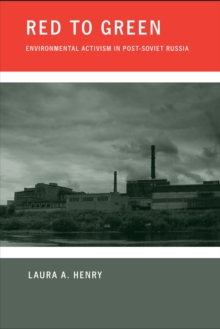Description
| Product ID: | 9780801476419 |
| Product Form: | Paperback / softback |
| Country of Manufacture: | US |
| Title: | Red to Green |
| Subtitle: | Environmental Activism in Post-Soviet Russia |
| Authors: | Author: Laura A. Henry |
| Page Count: | 296 |
| Subjects: | Non-governmental organizations (NGOs), Non-governmental organizations (NGOs), Environmentalist, conservationist and Green organizations, Environmentalist, conservationist & Green organizations, Russia |
| Description: | Red to Green is an organizational analysis of popular environmental mobilization that addresses the continuing role of the Soviet legacy, the influence of transnational actors, and the relevance of social mobilization theory to the Russian case. Environmental activism in contemporary Russia exemplifies both the promise and the challenge facing grassroots politics in the post-Soviet period. In the late Soviet period, Russia''s environmental movement was one of the country''s most dynamic and effective forms of social activism, and it appeared well positioned to influence the direction and practice of post-Soviet politics. At present, however, activists scattered across Russia face severe obstacles to promoting green issues that range from wildlife protection and nuclear safety to environmental education. Based on fifteen months of fieldwork in five regions of Russia, from the European west to Siberia and the Far East, Red to Green goes beyond familiar debates about the strength and weakness of civil society in Russia to identify the contradictory trends that determine the political influence of grassroots movements. In an organizational analysis of popular mobilization that addresses the continuing role of the Soviet legacy, the influence of transnational actors, and the relevance of social mobilization theory to the Russian case, Laura Henry details what grassroots organizations in Russia actually do, how they use the limited economic and political opportunities that are available to them, and when they are able to influence policy and political practice. Drawing on her in-depth interviews with activists, Henry illustrates how green organizations have pursued their goals by "recycling" Soviet-era norms, institutions, and networks and using them in combination with transnational ideas, resources, and partnerships. Ultimately, Henry shows that the limited variety of organizations that activists have constructed within post-Soviet Russia''s green movement serve as a "fossil record" of the environmentalists'' innovations, failures, and compromises. Her research suggests new ways to understand grassroots politics throughout the postcommunist region and in other postauthoritarian contexts. |
| Imprint Name: | Cornell University Press |
| Publisher Name: | Cornell University Press |
| Country of Publication: | GB |
| Publishing Date: | 2010-02-25 |


